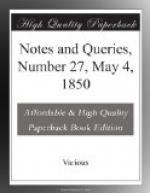I certainly expected to find, however, in the “List of the Fellows of the Society of Antiquaries,” due attention paid to this circumstance. The one just circulated was therefore referred to, and it would seem to be as full of anomalies as a “Court Guide” or a “Royal Blue Book.” We have, indeed, the Knights and Baronets duly titled, and the Peers, lay and spiritual, sufficiently distinguished both by capitals and mode of insertion. All those who have no other title (as D.D. or F.R.S.) recognised by the Society, are courteously designated by the affix “Esq.” In this, it will be strange indeed if all be entitled to the appellation in its legitimate sense; or, in other words, if the principle of courtesy does not supersede, amongst the otherwise untitled mass of Fellows, the principle of social rank. To this in itself, as the distinction of “Gent” after a man’s name has become derogatory, there cannot be the least objection; for antiquarianism does not palliate rudeness or offensive language.
At the same time, the adoption of this principle should surely be uniform, and invidious distinctions should not be made. The title “Esq.,” should not be given to one man, and left out in designating another whose social position is precisely the same. For instance, we find in this list “——, M.D.,” and “——, Esq., M.D.,” employed to designate two different Doctors in Medicine. We find “——, F.R.S.” and “——, Esq., F.R.S.” to designate two Fellows of the Society of Antiquaries, who are also Fellows of the Royal. We see one or two D.D.’s deprived of their titles of “Rev.,” and, as if to make amends (in point of quantity at least), we have one Fellow with titles at each end of his name that seem incompatible with each other, viz., “Rev. ——, Esq.”
Anomalies like these can only be the result of sheer carelessness, or of the ignorance of some clerk employed to make out the list without adequate instructions given to him. It has, in my hearing, been held up as a specimen of invidious distinction to gratify some petty dislike; but this notion is simply absurd, and deserves no notice. At the same time, it betokens a carelessness that it is desirable to avoid.
As a mere question of dignity, it appears to me to savour too much of Clapham-Common or Hampstead-Heath grandeur, to add much to our respectability or worldly importance. It would, indeed, be more “dignified” to drop, in the lists, all use of “Esq.” under any circumstances; or, if this be objected to, to at least treat “M.A.,” “D.D.,” “F.R.S.” as higher titles, in which the “Esq.” may properly be merged, and thus leave the appellation to designate the absence of any higher literary or scientific title.




